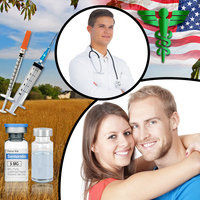Introduction to Low Libido in Men
Low libido, or a diminished sexual desire, is a prevalent concern among American males, affecting their quality of life and relationships. As societal pressures and biological factors intertwine, the quest for effective medical treatments has become increasingly important. This article delves into the current landscape of medical interventions designed to combat low libido, offering hope and insights to those affected.
Understanding the Causes of Low Libido
Before exploring treatments, it's crucial to understand the multifaceted causes of low libido. These can range from psychological factors such as stress and depression to physiological issues like hormonal imbalances, particularly low testosterone levels. Chronic diseases, medications, and lifestyle factors like alcohol consumption and smoking also play significant roles. Recognizing these causes is the first step toward effective treatment.
Pharmacological Interventions
Pharmacological treatments have been at the forefront of managing low libido. Testosterone replacement therapy (TRT) is a common approach for men with clinically low testosterone levels. TRT can be administered through injections, gels, or patches, aiming to restore testosterone to normal levels, thereby potentially enhancing libido. However, it's not without risks, including an increased chance of cardiovascular issues, which necessitates careful monitoring.
Another pharmacological option includes phosphodiesterase type 5 (PDE5) inhibitors, such as sildenafil and tadalafil, originally developed for erectile dysfunction. While primarily enhancing erectile function, some studies suggest they may also improve sexual desire, although the evidence is less robust compared to their effect on erectile function.
Psychological and Behavioral Therapies
Beyond medication, psychological and behavioral therapies offer a non-invasive approach to treating low libido. Cognitive-behavioral therapy (CBT) has shown promise in addressing the psychological underpinnings of low sexual desire. By helping men to manage stress, improve communication with partners, and address negative thoughts about sex, CBT can lead to significant improvements in libido.
Sex therapy, another psychological intervention, focuses on enhancing the sexual experience and addressing relational issues that might contribute to low libido. Techniques such as sensate focus, where partners engage in non-sexual touching to build intimacy, can be particularly effective.
Lifestyle Modifications
Lifestyle changes are often recommended as a first-line approach or in conjunction with other treatments. Regular exercise, particularly strength training, has been linked to improved testosterone levels and sexual function. A balanced diet, adequate sleep, and reduced alcohol and tobacco use can also play crucial roles in enhancing libido.
Emerging Treatments and Future Directions
The field of low libido treatment is evolving, with ongoing research into new pharmacological agents and non-invasive therapies. For instance, selective androgen receptor modulators (SARMs) are being investigated for their potential to increase libido with fewer side effects than traditional hormone therapies. Additionally, nutraceuticals and herbal supplements, such as ginseng and maca root, are gaining attention, although more rigorous research is needed to validate their efficacy and safety.
Conclusion: Navigating the Path Forward
The battle against low libido in American males is multifaceted, requiring a tailored approach that considers individual causes and preferences. While current treatments offer hope, ongoing research and open dialogue with healthcare providers are essential for navigating this complex condition. As medical science advances, the future looks promising for those seeking to reclaim their sexual vitality and enhance their overall well-being.
Contact Us For A Fast And Professional Response

- The Evolution of Medical Science in Addressing Low Libido Problems [Last Updated On: March 2nd, 2025] [Originally Added On: March 2nd, 2025]
- Exploring Strategies to Enhance Male Libido: Hormonal, Psychological, and Lifestyle Interventions [Last Updated On: March 3rd, 2025] [Originally Added On: March 3rd, 2025]
- Understanding and Managing Low Libido in American Men [Last Updated On: March 4th, 2025] [Originally Added On: March 4th, 2025]
- Exploring Hormonal Influences on Male Libido: Causes, Symptoms, and Treatment Options [Last Updated On: March 5th, 2025] [Originally Added On: March 5th, 2025]
- Understanding and Addressing Low Libido in Men: Causes and Effective Treatments [Last Updated On: March 6th, 2025] [Originally Added On: March 6th, 2025]
- Managing Decreased Libido Post-Menopause: Understanding Causes and Effective Solutions [Last Updated On: March 7th, 2025] [Originally Added On: March 7th, 2025]
- Understanding Low Libido: Causes, Impacts, and Solutions for Men's Sexual Health [Last Updated On: March 8th, 2025] [Originally Added On: March 8th, 2025]
- Unraveling the Link: Anxiety and Its Impact on Male Libido in the American Population [Last Updated On: March 8th, 2025] [Originally Added On: March 8th, 2025]
- Impact of Mental Health on Men's Libido: Strategies for Comprehensive Care [Last Updated On: March 9th, 2025] [Originally Added On: March 9th, 2025]
- Revitalizing Intimacy: Strategies for Overcoming Low Libido in Long-term Relationships Among American Males [Last Updated On: March 11th, 2025] [Originally Added On: March 11th, 2025]
- Unraveling the Link Between Chronic Diseases and Low Libido in American Males: A Comprehensive Medical Insight [Last Updated On: March 12th, 2025] [Originally Added On: March 12th, 2025]
- Exploring Medical Interventions for Low Libido in Postpartum Women: A Guide for American Males [Last Updated On: March 13th, 2025] [Originally Added On: March 13th, 2025]
- Advancements in Treating Low Libido: Innovations and Personalized Medicine for American Males [Last Updated On: March 15th, 2025] [Originally Added On: March 15th, 2025]
- Physical Causes of Low Libido in American Males: Hormones, Health, and Lifestyle [Last Updated On: March 16th, 2025] [Originally Added On: March 16th, 2025]
- Medication-Induced Low Libido: Causes, Impacts, and Management Strategies for American Men [Last Updated On: March 17th, 2025] [Originally Added On: March 17th, 2025]
- Understanding and Treating Low Libido in Men: A Comprehensive Guide [Last Updated On: March 17th, 2025] [Originally Added On: March 17th, 2025]
- Exploring Causes and Treatments for Low Libido in American Men [Last Updated On: March 18th, 2025] [Originally Added On: March 18th, 2025]
- Psychological Factors Impacting Low Libido in American Males: Stress, Depression, and More [Last Updated On: March 20th, 2025] [Originally Added On: March 20th, 2025]
- Low Libido in American Males: Health Risks and the Importance of Seeking Help [Last Updated On: March 20th, 2025] [Originally Added On: March 20th, 2025]
- Natural Supplements for Low Libido: Prospects and Benefits for American Men [Last Updated On: March 20th, 2025] [Originally Added On: March 20th, 2025]
- Exploring the Link Between Low Libido and Depression in American Men [Last Updated On: March 20th, 2025] [Originally Added On: March 20th, 2025]
- Hyperthyroidism's Impact on Libido in American Males: Causes, Effects, and Management [Last Updated On: March 20th, 2025] [Originally Added On: March 20th, 2025]
- Advances in Treating Low Libido: Hormonal, Psychological, and Lifestyle Innovations for Males [Last Updated On: March 21st, 2025] [Originally Added On: March 21st, 2025]
- Low Libido in American Males During Partner's Lactation: Causes and Solutions [Last Updated On: March 21st, 2025] [Originally Added On: March 21st, 2025]
- Managing Medication-Induced Low Libido: Causes, Strategies, and Solutions for Men [Last Updated On: March 21st, 2025] [Originally Added On: March 21st, 2025]
- Understanding and Treating Low Libido in American Males: A Holistic Approach [Last Updated On: March 22nd, 2025] [Originally Added On: March 22nd, 2025]
- Chronic Illness Impact on Libido: Strategies for American Males [Last Updated On: March 22nd, 2025] [Originally Added On: March 22nd, 2025]
- Diabetes and Low Libido in American Men: Causes, Management, and Emerging Therapies [Last Updated On: March 23rd, 2025] [Originally Added On: March 23rd, 2025]
- Exploring Treatments for Low Libido in American Males: Hormonal, Pharmacological, and Psychological Approaches [Last Updated On: March 23rd, 2025] [Originally Added On: March 23rd, 2025]
- Exploring Medical Interventions for Low Libido in American Males [Last Updated On: March 24th, 2025] [Originally Added On: March 24th, 2025]
- Understanding Low Libido in Men: Causes and Effective Solutions [Last Updated On: March 24th, 2025] [Originally Added On: March 24th, 2025]
- Low Libido in Middle-Aged Men: Causes, Treatments, and Future Innovations [Last Updated On: March 24th, 2025] [Originally Added On: March 24th, 2025]
- Understanding and Treating Low Libido in American Males: Causes and Solutions [Last Updated On: March 24th, 2025] [Originally Added On: March 24th, 2025]
- Childbirth's Impact on Male Libido: Understanding and Reviving Intimacy in American Men [Last Updated On: March 25th, 2025] [Originally Added On: March 25th, 2025]
- Understanding and Addressing Low Libido in American Males: A Comprehensive Guide [Last Updated On: March 25th, 2025] [Originally Added On: March 25th, 2025]
- Sudden Low Libido in American Males: Causes and Solutions [Last Updated On: March 25th, 2025] [Originally Added On: March 25th, 2025]
- Low Libido in American Men: Causes, Impacts, and Treatment Options [Last Updated On: March 25th, 2025] [Originally Added On: March 25th, 2025]
- Alcohol's Impact on Libido: Insights for American Men's Sexual Health Management [Last Updated On: March 25th, 2025] [Originally Added On: March 25th, 2025]
- Low Libido in American Males: Treatments, Risks, and Side Effects Overview [Last Updated On: March 25th, 2025] [Originally Added On: March 25th, 2025]
- Understanding and Addressing Low Libido in American Men: Causes, Impacts, and Solutions [Last Updated On: March 25th, 2025] [Originally Added On: March 25th, 2025]
- Understanding and Overcoming Low Libido in American Males: Causes and Solutions [Last Updated On: March 25th, 2025] [Originally Added On: March 25th, 2025]
- Understanding and Overcoming Low Libido in American Men: Causes and Solutions [Last Updated On: March 25th, 2025] [Originally Added On: March 25th, 2025]
- Understanding and Addressing Low Libido in American Men: Causes and Solutions [Last Updated On: March 26th, 2025] [Originally Added On: March 26th, 2025]
- Understanding and Treating Low Libido in American Men: Causes and Solutions [Last Updated On: March 26th, 2025] [Originally Added On: March 26th, 2025]
- Low Libido in American Males: Medical Causes, Impacts, and Treatment Options [Last Updated On: March 26th, 2025] [Originally Added On: March 26th, 2025]
- Pain Disorders and Low Libido in Men: Understanding the Connection and Management [Last Updated On: March 26th, 2025] [Originally Added On: March 26th, 2025]
- Medical Patterns and Interventions for Low Libido in Young American Males [Last Updated On: March 26th, 2025] [Originally Added On: March 26th, 2025]
- Low Libido in Male Surgical Patients: Causes, Management, and Holistic Recovery Strategies [Last Updated On: March 26th, 2025] [Originally Added On: March 26th, 2025]
- Low Libido in American Males: Hormonal, Pharmacological, and Holistic Treatment Approaches [Last Updated On: March 26th, 2025] [Originally Added On: March 26th, 2025]
- Restoring Libido in American Males Post-Chemotherapy: Medical and Holistic Approaches [Last Updated On: March 26th, 2025] [Originally Added On: March 26th, 2025]
- Understanding and Addressing Low Libido in Women Over 50: A Guide for Men [Last Updated On: March 26th, 2025] [Originally Added On: March 26th, 2025]
- Understanding and Treating Low Libido in American Males: Medical Insights and Interventions [Last Updated On: March 26th, 2025] [Originally Added On: March 26th, 2025]
- Understanding and Treating Low Libido in American Men: Causes and Solutions [Last Updated On: March 26th, 2025] [Originally Added On: March 26th, 2025]
- Post-Surgery Low Libido in Men: Causes, Management, and Recovery Strategies [Last Updated On: March 26th, 2025] [Originally Added On: March 26th, 2025]
- Understanding Low Libido in American Women: Causes, Impacts, and Treatment Options [Last Updated On: March 27th, 2025] [Originally Added On: March 27th, 2025]
- Lifestyle Changes to Boost Libido in American Men: Diet, Exercise, Sleep, and More [Last Updated On: March 27th, 2025] [Originally Added On: March 27th, 2025]
- Exploring Causes and Solutions for Low Libido in American Men [Last Updated On: March 27th, 2025] [Originally Added On: March 27th, 2025]
- Post-Pregnancy Libido Decline in American Males: Causes and Solutions [Last Updated On: March 27th, 2025] [Originally Added On: March 27th, 2025]
- Chronic Low Libido in American Males: Causes, Signs, and Treatment Options [Last Updated On: March 27th, 2025] [Originally Added On: March 27th, 2025]
- Low Libido in Male Athletes: Causes, Impacts, and Multifaceted Treatment Approaches [Last Updated On: March 28th, 2025] [Originally Added On: March 28th, 2025]
- Understanding and Treating Low Libido in American Men: Causes and Solutions [Last Updated On: March 28th, 2025] [Originally Added On: March 28th, 2025]
- Age-Related Low Libido in Men: Causes, Treatments, and Future Therapies [Last Updated On: March 28th, 2025] [Originally Added On: March 28th, 2025]
- Low Libido and Weight Gain in American Males: Exploring Physiological and Psychological Links [Last Updated On: March 28th, 2025] [Originally Added On: March 28th, 2025]
- Low Libido and Unhappiness in American Men: Causes, Impacts, and Solutions [Last Updated On: March 29th, 2025] [Originally Added On: March 29th, 2025]
- Hypertension's Impact on Libido: Management Strategies for American Men [Last Updated On: March 30th, 2025] [Originally Added On: March 30th, 2025]
- Revitalizing Male Libido: Hormonal, Psychological, and Lifestyle Strategies [Last Updated On: March 31st, 2025] [Originally Added On: March 31st, 2025]
- Exploring Low Libido in American Males: Causes, Research, and Effective Treatments [Last Updated On: April 2nd, 2025] [Originally Added On: April 2nd, 2025]
- Antidepressants and Low Libido: Impact and Management Strategies for American Males [Last Updated On: April 2nd, 2025] [Originally Added On: April 2nd, 2025]
- Medical Causes and Strategies for Combating Low Libido in American Men [Last Updated On: April 3rd, 2025] [Originally Added On: April 3rd, 2025]
- Exploring Causes and Solutions for Low Libido in American Males [Last Updated On: April 6th, 2025] [Originally Added On: April 6th, 2025]
- Medical Factors Impacting Low Libido in Women Under 40 in the U.S. [Last Updated On: April 6th, 2025] [Originally Added On: April 6th, 2025]
- Addressing Low Libido in American Males: Causes, Impacts, and Solutions [Last Updated On: April 6th, 2025] [Originally Added On: April 6th, 2025]
- Medical Procedures Impacting Male Libido: Causes and Management Strategies [Last Updated On: April 8th, 2025] [Originally Added On: April 8th, 2025]
- Addressing Low Libido in American Males: Causes, Impacts, and Solutions [Last Updated On: April 8th, 2025] [Originally Added On: April 8th, 2025]
- Addressing Low Libido in American Men: Causes, Treatments, and Holistic Approaches [Last Updated On: April 9th, 2025] [Originally Added On: April 9th, 2025]
- Understanding Low Libido in American Men: Hormonal, Psychological, and Lifestyle Factors [Last Updated On: April 10th, 2025] [Originally Added On: April 10th, 2025]
- Medical Causes of Persistent Low Libido in American Men: Insights and Treatments [Last Updated On: April 10th, 2025] [Originally Added On: April 10th, 2025]
- Understanding and Managing Low Libido in Men: Causes, Strategies, and Support [Last Updated On: April 10th, 2025] [Originally Added On: April 10th, 2025]
- Understanding and Diagnosing Low Libido in American Men: A Comprehensive Guide [Last Updated On: April 12th, 2025] [Originally Added On: April 12th, 2025]
- Medical Insights into Low Libido: Hormones, Conditions, and Treatments in American Men [Last Updated On: April 13th, 2025] [Originally Added On: April 13th, 2025]

















